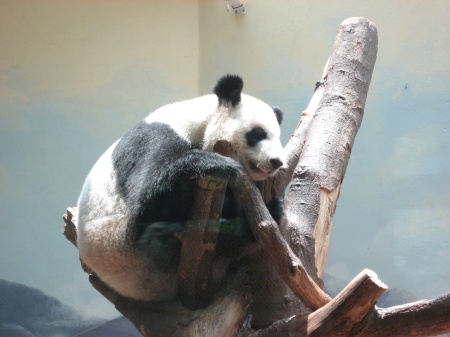The Chengdu Giant Panda Breeding Research Base in Sichuan Province announced that 11-year-old panda Lun Lun gave birth to a cub in Zoo Atlanta in the United States at 10:11 AM Beijing time on August 31.
 |
| A file photo of giant panda Lun Lun |
It was her second birth since the base and the US zoo launched an international panda breeding program in 1999. Lun Lun gave birth to Mei Lan at the zoo in Sept 2006.
Her second cub is the only giant panda born so far in the US in 2008, said Dennis Kelly, Zoo Atlanta's president and CEO.
The zoo is continuing to monitor Lun Lun closely for a possible second birth.
Twin births take place nearly 50 percent of the time with giant pandas.
A second cub could arrive as much as 12 to 24 hours after the first, according to Zhang Zhihe, chief of the base.
Lun Lun is caring for her cub, which is about the size of a human hand.
The zoo's veterinary team will conduct the cub's first checkup when it is deemed possible to do so without disrupting maternal care.
The zoo's animal management and veterinary teams, joined by Yang Kuixing, an official from the Chengdu base, will continue round-the-clock monitoring of the mother and cub, Kelly said.
Lun Lun and the cub's 11-year-old father Yang Yang are from the Chengdu base.
They arrived at Zoo Atlanta in 1999 on a 10-year loan from the Chinese government.
The couple's arrival was highly significant, said Atlanta Mayor Shirley Franklin.
Atlanta was the first city in the United States to receive pandas on loan from China, Franklin said.
She said she often took her grandson to the zoo to see the pandas, and that the panda's staple food, bamboo, grows in her backyard.
The pandas have boosted tourism in Atlanta and helped put the city on the map, Franklin said.
"The pandas have served as a bridge between Chengdu and Atlanta," she said.
"More and more young people are starting to learn more about China and Chengdu. As far as I know, many of them have been to Chengdu or are planning to visit Chengdu," Franklin added.
Due to human activities and environmental degradation, the pandas' natural habitat has been shrinking, with only 1,500 left in the world.
Chengdu is home to the world's only giant panda breeding and research base built in a large city.
The base is home to 80 pandas, according to deputy chief Tan Hongming.